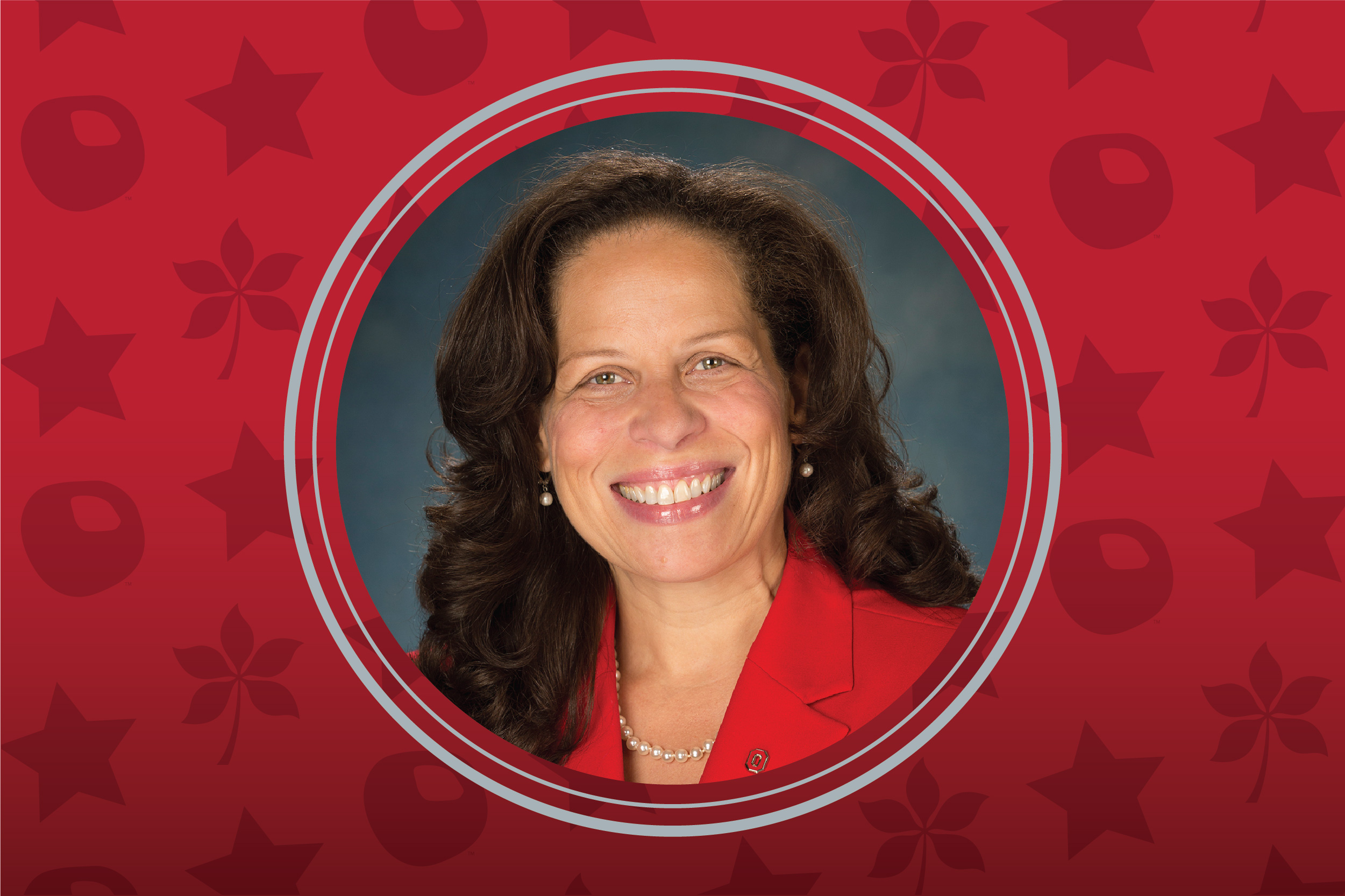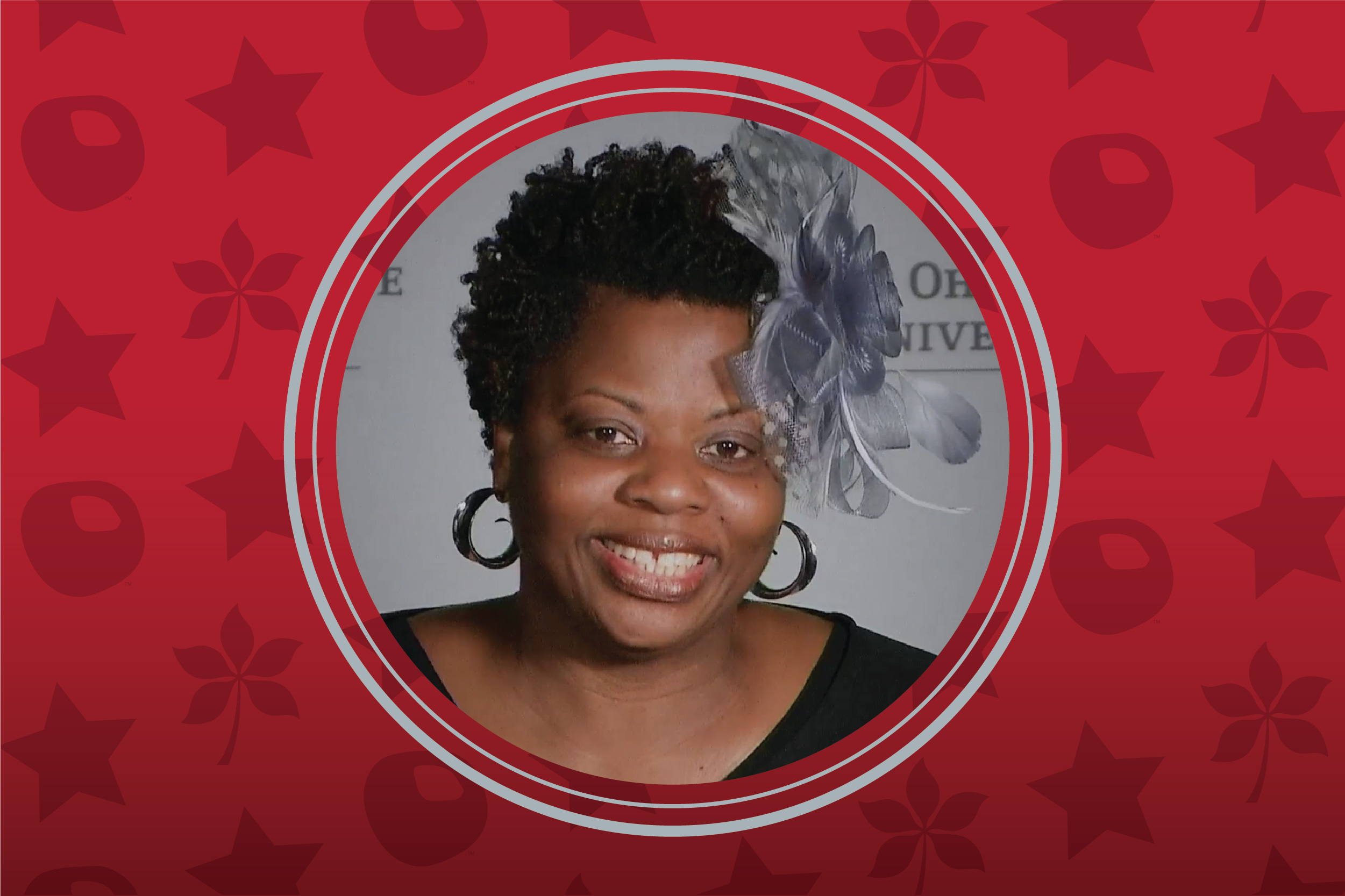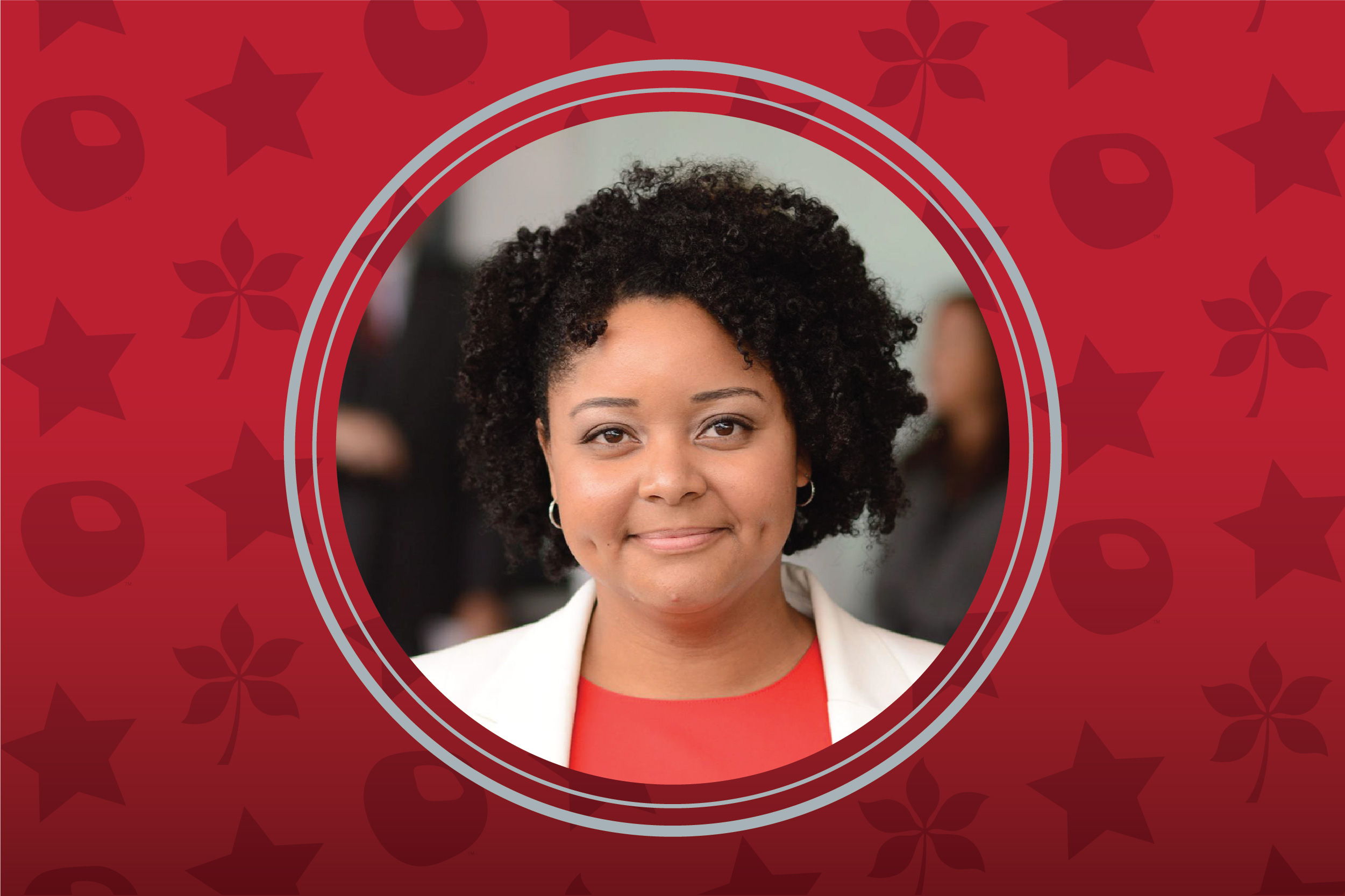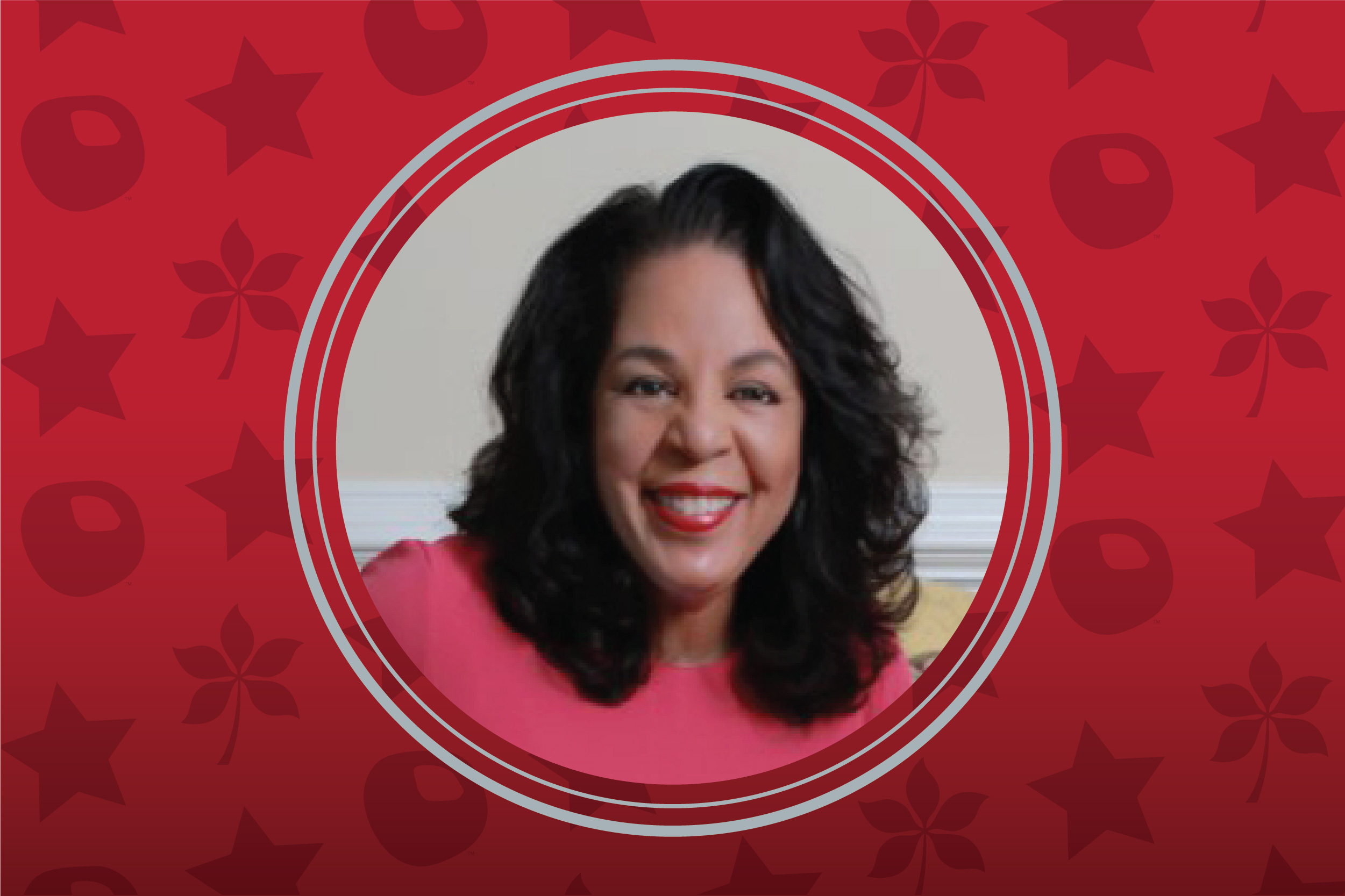
Each February, the EHE Legacy project highlights the unique contributions of past and present Black Buckeyes through an annual series of weekly showcases during the month of February of past and current Black excellence in the college.
Week of February 28th
Jenell Igeleke Penn
Jenell Igeleke Penn, PhD is a clinical assistant professor, the Assistant Director of Teacher Education and the Director of Recruitment, Mentoring and Retention for Diversity and Social Justice in the College of Education and Human Ecology’s Department of Teaching and Learning. A three-time alumnus of Ohio State University, she holds a B.A. in English, an M.Ed. in Integrated Language Arts Education, and a Ph.D. in Education. Before returning to the college, she taught English Language Arts and Humanities in Central Ohio schools for several years. Penn develops strategic initiatives that advance the college’s commitment to more diverse, equitable, and sustaining teacher education spaces. She is also a Cultivating New Voices Among Scholars of Color Fellow with National Council of Teachers of English. Her research, scholarship, and teaching interests center on critical literacies and the cultivation of affirming spaces and praxes for/with teachers, youth, and researchers of Color. In addition, Penn chairs the college’s annual Equity and Diversity Educator Conference for preservice, in-service, and community educators, and she co-facilitates book clubs and programming for youth in local school districts.
Dr. Erica Womack
Dr. Erica Womack is currently the Program Director for Made for Medicine, a program of Columbus Medical Association that serves as a programmatic solution to redress the underrepresentation of African Americans in the medical field. In this role, Dr. Womack is responsible for developing a 5-year plan for the overall vision of the program (divided into 3 phases). Because Made for Medicine is a newer initiative, Dr. Womack has been able to oversee the development of the program from the ground up and that includes admitting the first cohort of 15 Black middle schoolers in the fall of 2021.
For three years, Dr. Womack served as Chief Operating Officer of OASIS (Opening Access to STEAM in Informal Settings), a K-8 STEM enrichment company that she co-founded with her husband in 2015. Before beginning her journey as an entrepreneur, Dr. Womack worked as an Assistant Professor at Otterbein University in the Education Department and for six years as a high school English teacher in Columbus City Schools. Dr. Womack is also a proud graduate of The Ohio State University where she earned her doctoral degree in 2013 in the field of Black girl literacies. Her work in the above areas have given her deep and diverse experiences across many educational contexts and has furthered her commitment to access and equity for the Black community.
Dr. Womack is also the author of “Explorations of literacy and black girlhood in out-of-bound spaces” (a chapter featured in the book, Black Girl Literacies published in 2021), “Lessons in love, literacy, and listening: Reflections on learning with and from Black female adolescents” (a chapter featured in the 2014 American Educational Studies Association Critic’s Choice Book Award, Engaging culture, race, and spirituality in education: New visions, new dialogues), and a number of other journal articles. In addition, she has presented aspects of my work at various local, state, and national conferences.
In Dr. Womack’s spare time, she enjoys: spending time with her husband and two daughters, hanging out with friends, binge-watching crime drama TV series, reading lots of non-fiction, listening to music and podcasts and mentoring young girls and women. Most often, you can catch her relishing in the quiet time on her patio.

Karen Stansberry Beard
Karen Stansberry Beard (1983, 1989, 2008) is an associate professor and the Chair of Educational Administration. As an OSU three-time alumna, Karen takes tremendous pride in and continues to pay tribute to the ways her OSU education and renowned professors shaped her research in educational administration, organizational leadership, positive psychology, law, and Educational Policy, a program she holds affiliate membership. In addition to introducing Positive Psychology (engagement, enjoyment, and wellbeing) into the work of Educational Administration, she teaches Ethics and The Social and Political Context of Education where she intentionally builds leader capacity for policy implementation supportive of cross-cultural understanding and achievement gap reduction. Karen is married to Jacinto W. Beard (1990). She is the mother of three OSU alumnae, David (2013), Elisabeth (2017), and Matthew (2020), and grandmother to Cruz. Her daughter-in-law, Lynda Villagomez holds a dual appointment with OSU and Nationwide Children’s as a Pediatric Hematology/Oncology Clinical Instructor and Postdoctoral Researcher. And her niece, Karen Santos, the last of her parent’s grandchildren, will become an OSU alumna at the 2022 Spring commencement.
Week of February 21st
Robert M. Ransom received his B.S., M.A. and Ph.D. degrees from the College of Education at The Ohio State University. Dr. Bob (as his students and co-workers affectionately called him) in his thirty years of tenure at OSU has served as Director of several Offices, including The Special Services program, The Nigerian Education Program, and The Office of Affirmative Action. He retired as Director of the Office of Equity & Diversity, within our College of Education and Human Ecology. In this position he provided vision and leadership to create an environment that appreciated and valued equity and diversity, and ensured that the College’s graduates were prepared to be educators and leaders in our changing and diverse world. Under Dr. Bob’s leadership, the Office created effective programs, for students of Color, in all phases of the educational pipeline, from encouraging high school students to become urban teachers, to recruiting students to attain all levels of graduate degrees for work in higher education and educational administration.
Dr. Ransom’s research interests include multi-cultural research methodologies, educational program development and evaluation, and issues of equality and Affirmative Action in higher education. He has published research papers and made presentations at national conferences on these various topics. He has received numerous awards for his work, like the Distinguished Diversity Enhancement Award from the College of Education in 2006.

H. Richard Milner IV
H. Richard Milner IV (also known as Rich) is Cornelius Vanderbilt Distinguished Professor of Education and Professor of Education in the Department of Teaching and Learning at Peabody College of Vanderbilt University. His research, teaching and policy interests concern urban education, teacher education, African American literature, and the social context of education. Professor Milner’s research examines practices and policies that support teacher effectiveness in urban schools. Professor Milner is President-Elect of the American Educational Research Association, the largest educational research organization in the world. He is an elected member of the National Academy of Education and a Fellow of the American Educational Research Association. Professor Milner’s work has appeared in numerous journals, and he has published seven books. His most recent are: Start where you are but don’t stay there: Understanding diversity, opportunity gaps, and teaching in today’s classrooms (Harvard Education Press, 2010 and 2020, Second Edition), Rac(e)ing to class: Confronting poverty and race in schools and classrooms (Harvard Education Press, 2015) and These kids are out of control: Why we must reimagine classroom management for equity (Corwin Press, 2018).

Kia McKinnie (she/her)
Kia McKinnie (she/her) is a doctoral student at The Ohio State University in the Higher Education and Human Ecology EdD program. Kia earned both her bachelor’s degree in child development and her master’s in Education from The University of Akron. She will graduate with her doctorate in May 2022. Kia started her career at Ohio State in 2008 as an academic advisor for the human development and family science department in the college of education and human ecology. During her thirteen-year tenure in EHE, she worked in several leadership roles, including assistant, associate and most recently, director roles within the Office of Undergraduate Student Services, now, the Office of Academic Affairs. In addition, Kia served on the Ohio Department of Higher Education Taskforce for Diversifying the Teaching Profession. While in EHE, Kia’s honors include the 2017 EHE Susan La Flesche Picotte Award, the 2016 EHE Diversity Enhancement Award Winner, and the 2016 Who’s Who in Black Columbus-Emerging Leaders award. In 2021, she transitioned to the Transition and Academic Growth team in the Office of Academic Affairs as the inaugural director of academic success programs.
As a proud first-generation college graduate, Kia often credits her collegiate success to her high school experience as an Upward Bound student. The privilege of working with students from the same program fueled her unapologetic commitment to access, retention, and inclusive excellence.
Week of February 14th

Bryanna Stigger
Bryanna Stigger (she/her/hers) is a second-year doctoral student in the Doctor of Education (Ed.D.) Higher Education and Student Affairs (HESA) program within the College of Education and Human Ecology’s Department of Educational Studies here at The Ohio State University. Bryanna is a trailblazer, advocate, and activist for the underserved and underrepresented. She is passionate about amplifying Black voices who have historically been unseen and unheard. She has a passion for giving back to her community and is extremely happy to serve as the Licking County NAACP President. She strives to achieve equity and eliminate social injustices that disproportionally disenfranchise communities of color. Bryanna is an industrious, inspirational, and energetic leader who possess over a decade of diversity, equity, and inclusion expertise. She works diligently to dismantle systemic racism and oppression while increasing cultural awareness and cultural responsiveness. She recognizes the importance of creating initiatives, support services and resources to educate, inform, empower, and promote inclusive excellence.
In her professional career, Bryanna is the Program Manager of Inclusive Excellence in the College of Engineering at The Ohio State University where she manages diversity education programs and professional development workshops to advance the diversity and inclusion mission and vision of the College of Engineering (COE) and Knowlton School of Architecture (KSA). She serves as the education specialist for inclusive excellence and diversity, equity and inclusion and works diligently to cultivate a welcoming and inclusive environment for all faculty, staff, and students alike. Bryanna develops and facilitates special programs on diversity, equity and inclusion topics including but not limited to inclusive classroom practices, implicit bias, cultural awareness, and building an inclusive environment. She also hosts the college’s 365 DEI community dialogue series and collaborates with hiring managers to facilitate training on inclusive excellence hiring practices and retention initiatives.
Bryanna is an exceptionally dedicated and enthusiastic leader with a superb record of providing exemplary service and support to enhance outreach and engagement initiatives that promote justice, equity, diversity, and inclusion (JEDI). She is a social justice practitioner who prides herself on cultivating an environment of inclusive excellence for all to not only survive but thrive. As a social and racial justice activist, mental health advocate, and educator Bryanna is committed to promoting inclusive excellence and cultivating an environment for all to feel safe, supported, and included. She is also a certified professional life coach and recently launched her business, Bry Inspired coaching, and consulting, www.bryinspired.com, where she empowers others to grow, elevate and discover their greatest potential to live the life of their dreams!
Favorite Quote: “There is always light, if only we’re brave enough to see it. If only we’re brave enough to be it.” – Amanda Gorman
Donna Y. Ford, PhD, is a Distinguished Professor in the College of Education and Human Ecology the Ohio State University. She is also a Faculty Affiliate with the Kirwan Institute and the Center for Latin American Studies. Professor Ford is in the Department of Educational Studies, the Special Education Program.
She was at Vanderbilt University for 15 years and held two Endowed Chairs there. Dr. Ford was a Professor of Special Education at the Ohio State University, an Associate Professor of Educational Psychology at the University of Virginia, and an Assistant Professor at the University of Kentucky.
Professor Ford earned her Doctor of Philosophy degree in Urban Education (educational psychology) (1991), Masters of Education degree (counseling) (1988), and Bachelor of Arts degree in communications and Spanish (1984) from Cleveland State University.
Professor Ford conducts research primarily in gifted education and culturally responsive/multicultural/urban education. Specifically, her work focuses on: (1) the achievement gap; (2) recruiting and retaining culturally different students in gifted education; (3) multicultural curriculum and instruction; (4) culturally competent teacher training and development; (5) African-American identity; and (6) African-American family involvement. She consults with school districts, and educational and legal organizations on such topics as gifted education under-representation and Advanced Placement, multicultural/urban education and counseling, and closing the achievement gap.
Professor Ford has written over 300 articles and book chapters; she has made over 2,000 presentations at professional conferences and organizations, and in school districts.
She is the author/co-author/co-editor of 14 books, including Gumbo for the Soul: Liberating Memoirs and Stories to Inspire Females of Color (2017); Telling Our Stories: Culturally Different Adults Reflect on Growing Up in Single-Parent Families (2017); R.A.C.E. Mentoring Through Social Media:Black and Hispanic Scholars Share Their Journey in the Academy (2017); Recruiting and Retaining Culturally Different Students in Gifted Education (2013), Reversing Underachievement Among Gifted Black Students (1996, 2010), Multicultural Gifted Education (1999, 2011), Gifted and Advanced Black Students in School: An Anthology of Critical Works (2011). In Search of the Dream: Designing Schools and Classrooms that Work for High Potential Students from Diverse Cultural backgrounds (2004), Diverse Learners with Exceptionalities: Culturally Responsive Teaching in the Inclusive Classroom (2008), and Teaching Culturally Diverse Gifted Students (2005).
Professor Ford’s work has been recognized by numerous professional organizations: Newsweek RHSU Edu-Scholar Public Influence Ranking; Stanford University Study’s Top 2% of World Scientists; Research Award from the Shannon Center for Advanced Studies; the Early Career Award and the Career Award from The American Educational Research Association; Senior Scholar Award and Early Scholar Award from The National Association for Gifted Children; the Esteemed Scholarship Award from The National Association of Black Psychologists; the Outstanding Service Award from the Council for Exceptional Children-The Association for the Gifted. She is the Vanderbilt University SEC Faculty Award recipient (2013). Professor Ford is even more proud and humbled by awards received from student organizations (Black Student Alliance Distinguished Faulty Award, and Jimmie Franklin Outstanding Vanderbilt Faculty Award).
Dr. Ford is co-founder of the Scholar Identity Institute (SII) for Black MalesTM, and creator of The Ford Female Achievement Model of Excellence (FAME). Donna is a two-time board member of the National Association for Gifted Children, and has served on numerous editorial boards, such as Gifted Child Quarterly, Exceptional Children, Roeper Review, Journal of Negro Education, Gifted Child Today, and Journal of Educational Psychology. She also reviews for several journals in such disciplines and topics as urban education, the achievement gap, educational psychology, and counseling and development. Professional development includes membership in professional organizations, including the National Association for Gifted Children, Council for Exceptional Children, American Educational Research Association, National Association for Multicultural Education, American Association of Colleges and Teacher Educators, and others.
On a personal note, she is the proud mother of Khyle L. Ford and proud grandmother of Khyle Jr. (KJ) – DYF

Dr. Jonda C. McNair
Dr. Jonda C. McNair is the Charlotte S. Huck Endowed Professor of Children’s Literature at The Ohio State University. She specializes in literature intended for youth with an emphasis on books written by and about African Americans. She is a past chair of the Coretta Scott King Book Awards Committee and was a member of the 2019 Randolph Caldecott Award Selection Committee. Dr. McNair recently completed a term as chair of the 2021 John Newbery Award Selection Committee. She is a former coeditor of Language Arts, the journal of the Elementary Section of the National Council of Teachers of English. Her work has appeared in journals such as Review of Educational Research, The Reading Teacher, Language Arts, Young Children, The Journal of Negro Education, and Children’s Literature in Education. Dr. McNair is a former elementary school teacher of students in grades K-2.
Week of February 7th

Khadijah A. Jones
Khadijah A. Jones (she/her) is currently a second-year doctoral student at The Ohio State University in the Higher Education and Student Affairs EdD program. Khadijah earned her Master’s in Organizational and Communications Studies from Ohio University’s Scripps College of Communications. She recently transitioned from her eleven-year role in overseeing access and diversity initiatives at Ohio State, to the Associate Director for Domestic Outreach and Recruitment at the university. She has dedicated her career to moving initiatives to their fullest potential to meet the individual needs of marginalized students. As a first-generation college student, who graduated from Cleveland’s East Technical High School, she is focusing her doctoral studies on BIPOC students, administrative staff, and faculty experiences at Predominantly White Intuitions. Her focus is to move initiatives she oversees to national models, with the goal of creating a blueprint for others to model across the country to better serve their students.
She started her career working at several non-profit organizations, such as, the Boys & Girls Clubs of Columbus and Directions for Youth and Families, where she has been unwavering in connecting students who have been systemically marginalized to educational resources and support services, while being a servant leader. Khadijah’s higher education career started with two years of service to Ohio State’s Office of Diversity and Inclusion’s TRiO Upward Bound Program.
She is currently participating in The California State University Student Success Analytics Program with a cohort of colleagues from the Office of Student Academic Success and the Office of Diversity and Inclusion. Khadijah lives with her partner, Nick, and their son, Nicky, in Columbus, Ohio.

Leslie T. Fenwick, PhD, has worked in every sector of American education – as a PK-12 school teacher and administrator in urban public and private schools; university faculty member and administrator; foundation program officer; nonprofit board member; and, legislative aid in the State of Ohio Senate. In 2020, Dr. Fenwick was one of two finalists vetted for the U.S. Secretary of Education post.
Dr. Fenwick currently serves as Dean in Residence at the American Association of Colleges for Teacher Education (AACTE), a leading Washington DC-based policy organization. Additionally, she is Dean Emerita of the Howard University School of Education where she is a tenured professor of education policy. During her tenure as dean, the School of Education attained first-time ranking by U.S. News and World Report (USNWR) as one of the nation’s top-100 Schools/Colleges of Education. Additionally, as dean she instituted a Capitol Hill Policy Forum annually attended by 300 educators and legislators dedicated to crafting education and social policies that advance education equity, college access, and workforce participation.
Dr. Fenwick’s forthcoming book (Jim Crow’s Pink Slip: The Untold Story of Black Principals and Teachers), published by Harvard Press, examines the history of educator workforce diversity and its relationship to the nation’s education equity goals. The book has already been referenced by the New York Times and Education Week. She is also a contributing author to the best-selling book, The Last Word: The Best Controversy and Commentary in American Education.
Dr. Fenwick’s op-ed articles about education equity, the economy, and urban development have appeared in the Washington Post, The Boston Globe, Education Week, The Huffington Post, Politico, and Diverse Issues in Higher Education. Her research on educator workforce diversity has been cited by the New York Times and the Center for American Progress. She is author of the widely disseminated National Academy of Education-commissioned policy report, A Tale of Two Cities: State Evaluation Systems of Teacher Preparation Programs which examines the inequitable assignment and availability of fully credentialed teachers in the nation’s school districts. Fenwick has also been an invited speaker at the National Press Club and appeared on CNN, C-SPAN, Washington Post LIVE, and delivered more than 200 national and international invited lectures on equal educational opportunity and equity, leadership, and workforce development.
Since 2017, Dr. Fenwick has served as a Senior Fellow for the McDonald Character Leadership Program at the U.S. Military Academy at West Point where she occasionally lectures about ethical leadership and delivered the 2018 Corbin Leadership Distinguished Lecture. She held consecutive appointments at Harvard University as a Visiting Scholar and Visiting Fellow and has served as an appointed member of a National Academy of Sciences education committee.
Presently, Dr. Fenwick is consultant to CEO Action for Racial Equity founded by Tim Ryan, U.S. Chairman and Senior Partner, PwC. CEO Action for Racial Equity is the first business-led coalition (comprised of corporate chairmen and CEOs) of its kind with a mission to advance racial equity through public policy. This initiative was recently featured in the New York Times.
Dr. Fenwick is one of 11 nationally-recognized scholars who serves as a member of the Scholarly Advisory Committee (SAC) for the Smithsonian National Museum of African American History and Culture (NMAAHC) – the world’s third busiest museum. The SAC was established by noted historian Dr. John Hope Franklin to help set the museum’s intellectual agenda and exhibition content.
Dr. Fenwick is regularly called upon to testify about educational equity, college access, and workforce development and diversity to the U.S. Senate, National Conference of State Legislatures (NCSL), U.S. Conference of Mayors, National Urban League, Congressional Black Caucus (CBC), American Federation of Teachers (AFT), Education Writers Association (EWA), National Education Association (NEA), National Association for Equal Opportunity in Higher Education (NAFEO), Hispanic Association of Colleges and Universities (HACU), National Alliance of Black School Educators (NABSE), and the Washington Policy Seminar.
Dr. Fenwick is a 2014 Salzburg Global Fellow (the cohort was convened in Salzburg, Austria to examine globalization and leadership) and a member of the 1999 cohort of American university administrators invited to the University of Oxford (Exeter College) to discuss ethics and leadership. Dr. Fenwick is the 2011 recipient of the WEB DuBois Award for Leadership in Higher Education.
Dr. Fenwick earned a PhD in educational policy and leadership from The Ohio State University where she was a Flescher Fellow and a bachelor’s degree in elementary education from the University of Virginia.

Erin M. Satterwhite, M.S. (She/Her/Hers) is an unapologetically Black third-year Ph.D. student currently in candidacy at The Ohio State University’s Higher Education and Student Affairs Program. She is currently working on her dissertation about the evolution diversity race-based languages and senior institutional administrators. Erin considers herself a scholar-activist-educator and co-conspirator in educational equity. Her research interests include student activism, institutional response, social justice efficacy, Black women, and racial battle fatigue, as well as the complexities of racial solidarity in higher education. Erin has recently co-authored a book chapter on Activism in Volume 37 of the Higher Education: Handbook of Theory and Education, as well as a peer-reviewed article on Black survival and solidarity in the International Journal of Qualitative Studies in Education. In addition to her published works, Erin has also presented at numerous national conferences like ASHE, ACPA, NASPA, and AERA in her time as a graduate student. She is a very active and vocal advocate in her program, becoming the inaugural elected Ph.D. student representative for the HESA program in 2020. Erin has been an instructor at both tOSU and her alma mater, Florida State University, teaching leadership, social justice, student development theory, and student affairs. She has also conducted numerous talks and guest lectures on identity, power, racial battle fatigue, and student activism. Before starting full-time as a Ph.D. student, Erin served as the Program Coordinator of Campus Visits and oversaw the University Ambassador tour guide program at tOSU. She holds a Bachelor in Science in Communication and Public Relations from East Carolina University and a Master of Science in Higher Education from Florida State University.

